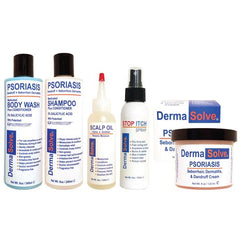Nutrition and Psoriasis: What Supplements Should You Take?
by Michael Marenick on Aug 02, 2016

What Are The Best Supplements For Psoriasis?
Since most dietary supplements, vitamins and herbal treatments are not regulated by the FDA there is little scientific evidence available about the effectiveness of these products to treat psoriasis. There is however, a considerable amount of data available on how nutrition and psoriasis are related.

What Supplements Should You Take?
Medical research has shown that diets low in fat can help prevent serious illnesses such as heart disease and cancer. Studies have also shown that psoriasis itself can cause the body to be deficient in certain vitamins and nutrients that are necessary for a healthy life. Below is a list of supplements that some individuals have taken to improve their life with psoriasis. This by far is not a complete list, and the claims made about each of them are strictly the experiences of individuals who have used them. These claims are not intended to treat any disease. Before taking adding any new supplements to your diet we recommend you speak with your doctor about it first. However, a healthy lifestyle of good nutrition is always a great start to a healthy body.
Nutrition and Psoriasis: Fish Oil
Medical doctors at the Royal Hallamshire Hospital have released results of a clinical trial designed to evaluate the effects of oral supplementation with fish oils in the treatment of psoriasis. The 28 patients involved in the trial had all been diagnosed with chronic psoriasis. They were randomized into two groups, with one group receiving 10 fish oil capsules (containing 1.8 grams of EPA), and the other group receiving 10 olive oil capsules every day for the duration of the 12-week trial. After 8 weeks of treatment there was a significant reduction in itching, erythema and scaling in the fish oil group and a trend towards a decrease in the surface area of skin affected by the disease. No significant changes occurred in the placebo group. The researchers conclude that fish oil supplementation is useful in the treatment of psoriasis particularly when itching is a major problem.
Nutrition and Psoriasis: Folic Acid
In a Townsend Letter for doctors and patients the results of a study done on folic acid were revealed. The study showed that seven patients with long-standing psoriasis were given 20 mg of folic acid 4 times per day. Marked improvements were noted after 3-6 months of treatment.
Nutrition and Psoriasis: Forskolin
Forskolin is an extract from the plant, Coleus forskohli. Coleus has been traditionally used in Ayurvedic medicine for a variety of conditions, including hypertension, asthma, eczema, psoriasis, congestive heart failure, and angina. The effects of forskolin have been intensively researched in in-vitro, animal, and human clinical studies.

Nutrition and Psoriasis: Milk Thistle
Milk thistle (Silybum marianum or Cardus marianum) is a plant used for treating liver disorders, breast feeding problems, and other illnesses. The active ingredient of the herb, silymarin, is found in the ripe seeds of the plant. The milk thistle plant has a long stem, green leaves with white spots, and pink to purple spiky flowered head (which true to its name, resembles a thistle). The plant is native to Europe and grows in the wild in the United States and South America. Other common names for the plant include Mary thistle, St. Mary thistle, Marian thistle, and lady’s thistle.
Milk thistle is prescribed for a number of medicinal uses, including liver disease treatment and prevention, HIV treatment, lactation problems, gallbladder disorders, mushroom poisoning, and psoriasis.
Nutrition and Psoriasis: Multi-Vitamin
Take a Multivitamin daily. Try to take a multivitamin that is high in antioxidants. Taking a multivitamin helps to provide you with all of the basic vitamins and nutrients needed for general health. This can also help treat a few types of vitamin deficiencies which can worsen Psoriasis.
Nutrition and Psoriasis: Oregano Oil
Although there is no well-controlled scientific data to support the idea, many psoriasis sufferers swear by oregano oil. Oregano oil contains both antibacterial and antifungal properties, both of which are useful in psoriasis patients. Some patients, however, report issues such as contact dermatitis when the oil is applied to the skin. Diluting the oregano oil in a carrier oil (such as olive oil) that is gentle to the skin may decrease skin irritation.
Nutrition and Psoriasis: Vitamin B12
Vitamin B12 has been shown to make a noticeable difference in Psoriasis after an average of 6 weeks.
Nutrition and Psoriasis: Vitamin C
Vitamin C has also been shown to help prevent Psoriasis outbreaks and lessen the severity. The results can usually be seen in approximately 2 weeks.
Nutrition and Psoriasis: Vitamin D
Vitamin D actually refers to a group of steroid molecules. Vitamin D is called the sunlight vitamin because the body produces it when the sun’s ultraviolet B (UVB) rays strike the skin. Vitamin D is important for the proper absorption of calcium from food. It is vital for the control of the levels of calcium in the blood and also controls the rate at which the body excretes calcium in the urine. Low levels of vitamin D and insufficient sunlight exposure are associated with osteoporosis. Maintaining sufficient vitamin D levels may help decrease the risk of several autoimmune diseases.
Nutrition and Psoriasis: Did you know?
Eggs contain almost every vitamin mineral and protein necessary for life. Think about it, a baby chick survives on what is in the egg until it hatches. The egg contains over 70 vitamins, minerals and proteins beneficial to the health and well being of our bodies. Today, Ovasome Technology allows for topical application of the nourishment found in eggs.
What Supplements Should You Take?
Eating healthy foods is always the best way to get the proper nutrition that you need. People who suffer with psoriasis often need higher levels of some of these vitamins so adding supplements to your daily routine can often help. Hope this article helps you understand Nutrition and Psoriasis.





